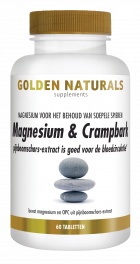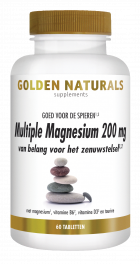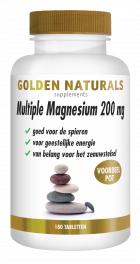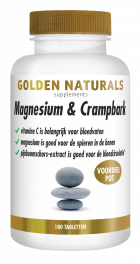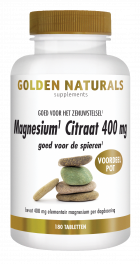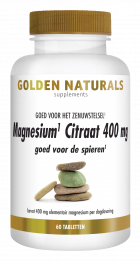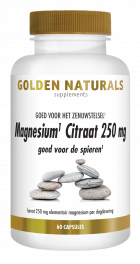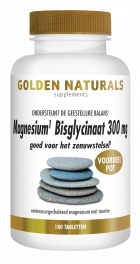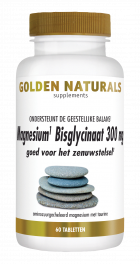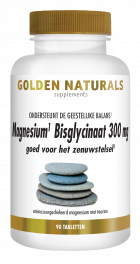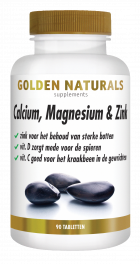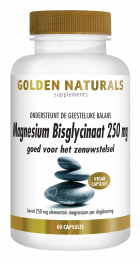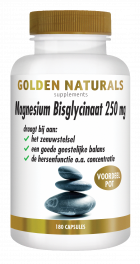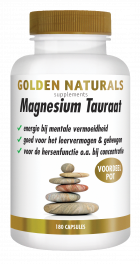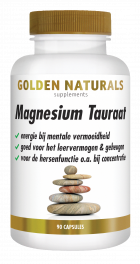How magnesium contributes to a more energetic life
- Apr 17, 2024
Are you aware of the crucial role magnesium plays in your daily energy levels? And have you ever wondered how a simple nutrient can have such an impact on how energetic you feel? Magnesium, an essential mineral involved in more than 300 biochemical reactions in the body, is fundamental to a healthy and energetic life. It not only contributes to the reduction of fatigue, but also plays a crucial role in energy metabolism, which helps us feel more energetic.
Recent studies highlight the significance of magnesium in improving energy production at the cellular level and why it is recommended. A study published in the "Journal of Nutrition" illustrates that individuals who consume adequate amounts of magnesium often exhibit better energy levels and improved physical performance. Another study conducted by the American College of Nutrition found that magnesium supplementation was positively associated with an increase in energy levels and a decrease in feelings of fatigue in participants.
The importance of magnesium for the body is clear, but how do you ensure that you get enough? And which natural sources of magnesium can help you increase your daily intake? Here we describe the essential importance of magnesium and how it contributes to a more energetic life through proper nutrition and, if necessary, supplementation with nutritional supplements.

What is Magnesium?
Magnesium is a nutrient that is vital to our health, but which our body cannot produce itself. So it must be obtained through diet or supplements. Magnesium is involved in more than 300 enzymatic reactions that are essential for energy production, protein synthesis and support of the nervous system. An adequate magnesium intake supports normal energy-yielding metabolism and helps reduce fatigue.
Magnesium for energy and fatigue reduction
One of the most appreciated roles of magnesium in the body is its contribution to the reduction of tiredness and fatigue. Through its involvement in the conversion of food into usable energy, magnesium helps support normal energy-yielding metabolism. This makes it an essential nutrient for people who pursue an active lifestyle or often feel tired.
Magnesium and brain function: more than just energy
In addition to supporting our physical health, magnesium also plays a role in promoting healthy brain function. It contributes to the normal functioning of the nervous system and helps maintain cognitive functions, making it important for memory and concentration. These properties make magnesium an important mineral for students, professionals and the elderly who want to support their mental acuity and well-being.
Supporting muscle function
Magnesium also contributes to normal muscle function, which is essential for everything from daily movement to sports performance. It helps regulate the contraction and relaxation of muscles, reducing the risk of cramps and muscle tension. For athletes and anyone who is regularly physically active, adequate magnesium intake can help optimize muscle function and support recovery after exercise.
Does your body have enough magnesium? Signals you can pay attention to
Magnesium plays a crucial role in numerous bodily functions, ranging from energy production to muscle and nerve function. Because the body does not produce magnesium itself, it is crucial to get this mineral through food or supplements. It is possible to develop a magnesium deficiency. Inadequate intake can lead to noticeable physical signals. Below is an overview of signs that may indicate sub-optimal magnesium intake.
Feelings of fatigue: Magnesium contributes to the reduction of fatigue. A feeling of persistent fatigue may therefore indicate a sub-optimal intake of this mineral.
Occasional muscle tension: Magnesium supports normal muscle function. Occasional tension or stiffness can be signals that need attention.
Nerve sensitivity: This nutrient plays a role in the normal functioning of the nervous system. Increased sensitivity or irritability can be a sign of sub-optimal magnesium intake.
Support healthy sleep patterns: Magnesium contributes to the maintenance of healthy sleep patterns. Difficulty sleeping may be associated with magnesium intake.
Foods Rich in Magnesium; the energy in your life
But what exactly does Magnesium contain? Which products do you need to provide your body with extra magnesium? Below you will find a list of foods rich in magnesium and suggestions for how you can incorporate them into your daily diet.
Foods Rich in Magnesium
- Green leafy vegetables, such as spinach and kale, are excellent sources of the mineral magnesium. A simple way to add more green leafy vegetables to your diet is to use them in salads, smoothies, or as a side dish with your dinner.
- Nuts and seeds, especially pumpkin seeds, almonds and cashews, contain significant amounts of magnesium. They're perfect as a snack, or you can add them to yogurt, oatmeal, or salads for extra crunch and nutritional value.
- Whole grain products, such as whole wheat bread, brown rice, and quinoa, are good sources of magnesium. These products can serve as a basis for meals, adding extra vegetables and protein sources for a complete meal.
- Beans and lentils not only provide magnesium, but are also rich in fiber and protein. Use them in soups, salads, or as the main ingredient in vegetarian burgers.
- Bananas are not only a convenient and tasty snack, but also a good source of magnesium. Add them to your morning cereal or use them in smoothies.

The importance of a balanced diet for sufficient magnesium intake
Incorporating a variety of magnesium-rich foods into your daily diet is important to feel fit and energetic. A balanced diet, rich in vegetables, fruits, whole grains, nuts and seeds, provides not only dietary magnesium, but also a range of other nutrients important to your health.
Magnesium as a supplement: Benefits and considerations
Magnesium is an essential mineral that contributes to many bodily functions, including supporting energy levels and reducing fatigue. Below is a range of magnesium supplements, formulated to meet various health needs and lifestyles. View the magnesium supplement that suits you.
Magnesium Bisglycinate 250 mg (capsules): This supplement provides a highly absorbable form of magnesium that contributes to the reduction of tiredness and fatigue. It also supports normal muscle and nervous system function.
Magnesium Bisglycinate 300 mg (tablets) : Similar to the 250 mg capsules, but in a higher dosage to support muscle function and psychological function, as well as the maintenance of strong bones and teeth.
Magnesium Citrate 250 mg (capsules): Magnesium citrate is an easily absorbable form of magnesium that contributes to normal energy-yielding metabolism and reduction of fatigue.
Magnesium Citrate 400 mg (tablets) : A higher dose for effective support of energy levels, muscle function, and the maintenance of normal bone structure.
Magnesium & Crampbark : A unique combination that not only provides the benefits of magnesium, but also contains crampbark for extra support in relaxing muscles and relieving cramps.
Magnesium Sport: Specifically formulated for athletes. This supplement contains Magnesium Malate and supports a good electrolyte balance, contributing to normal protein synthesis and muscle function, which is essential for any sports performance.
Multiple Magnesium 200 mg: A versatile magnesium supplement that combines different forms of magnesium for optimal absorption and effectiveness.
Calcium, Magnesium & Zinc: A combination product that not only provides the benefits of magnesium, but also contains calcium and zinc to support bones, teeth, and a healthy immune system.
Magnesium Taurate: A special form of magnesium bound to taurine, which can contribute to better cardiovascular health and support the nervous system.
Lifestyle changes for better absorption of Magnesium
Optimizing your magnesium intake goes beyond just adding magnesium-rich foods or supplements to your diet. A holistic approach, paying attention to your overall lifestyle, can improve the absorption and use of magnesium in your body. Below are some recommendations for lifestyle changes that can not only promote magnesium absorption, but also contribute to your overall health and feeling 'good'.
Reduce stress: Chronic stress can increase urinary excretion of magnesium, leading to its lower availability in the body. Practicing stress-reducing activities such as yoga, meditation, and deep breathing exercises can help maintain magnesium levels.
Increase physical activity: Regular exercise not only boosts overall health but can also improve magnesium absorption. However, it is important to replenish lost minerals, including magnesium, after exercise.
Improve your diet: In addition to eating magnesium-rich foods, it is important to maintain a balanced diet rich in vitamins and minerals that support magnesium absorption, such as vitamins D, K, and calcium.
Limit alcohol and caffeine consumption: Excessive consumption of alcohol and caffeine can interfere with magnesium absorption and retention in the body. Moderating these consumptions can help maintain optimal magnesium levels.

A little Magnesium every day
It is clear: magnesium deserves a place in everyone's life. By making conscious choices about what we eat, how we live, and the supplements we choose, we can provide our bodies with this essential mineral. So let's not forget to give magnesium the attention it deserves, for a healthier, more energetic life.
Take the time to evaluate and optimize your magnesium intake. Your body will thank you. And remember, if you have any doubts or questions about your health, always consult a professional. Your path to a more energetic life starts with one step today. Let's make it count!



